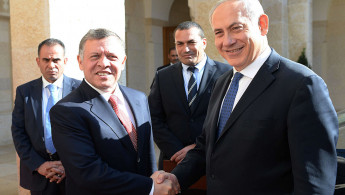Jordan: Israeli embassy killer goes home after 'face-saving' deal reached over al-Aqsa mosque
Israel’s embassy staff in Amman, including the security officer, returned from Jordan through the Allenby Crossing on Monday night, according to a statement from the Israeli prime minister's office.
The statement said the return of the staffers, led by Ambassador Einat Schlein, was facilitated by “close cooperation” between Israel and Jordan.
Faced with popular anger, including from families of the victims who include a teenager, Jordan initially said it wanted to question the Israeli officer over the incident. Israel's government claims he had acted in self defence after being attacked during an altercation outside the Israeli embassy.
Reports in local press suggested the Jordanian government would not allow him to leave the country.
However, Israel refused to hand him over. Israel's foreign ministry later said "in accordance with the Vienna Convention, the security officer has immunity from investigation and imprisonment".
 |
Press reports suggest a face-saving deal was reached to help Amman absorb the outrage over the killing of two citizens on Jordanian soil, involving Israel's easing of controversial security measures at the sensitive al-Aqsa mosque |  |
Press reports suggested a face-saving deal was reached to help Amman absorb the outrage over the killing of two citizens on Jordanian soil, involving Israel's easing of controversial security measures at the sensitive al-Aqsa mosque in Jerusalem, of which Jordan is custodian.
Netanyahu's office denied that Amman had demanded metal detectors installed at al-Aqsa be removed as a condition for securing the passage of the Israeli security guard, but a statement by the Jordanian king on Monday had implicitly linked the two issues.
According to a readout published by Jordanian state media on Monday, the king demanded Israel find an “immediate solution” to ongoing crisis at al-Aqsa, and remove metal detectors it installed at entrances to the site.
The king spoke of “the necessity to remove the measures taken by the Israeli side since the recent crisis began,” in reference to the unrest across Jerusalem and the West Bank ongoing since July 14.
A statement from Netanyahu's office said that metal detectors would be removed and replaced with "security inspection based on advanced technologies and other means".
Israel and Jordan are bound by a 1994 peace treaty, but tensions have been high in recent days after Israel put in place security measures at the al-Aqsa mosque in annexed east Jerusalem.
Israel installed metal detectors at entrances to the site following an attack nearby that killed two policemen.
Palestinians view the move as Israel asserting further control over the Haram al-Sharif mosque compound, known to Jews as Temple Mount.





 Follow the Middle East's top stories in English at The New Arab on Google News
Follow the Middle East's top stories in English at The New Arab on Google News
![The UAE is widely suspected of arming the RSF militia [Getty]](/sites/default/files/styles/image_330x185/public/2024-11/GettyImages-472529908.jpg?h=69f2b9d0&itok=Yauw3YTG)
![Netanyahu furiously denounced the ICC [Getty]](/sites/default/files/styles/image_330x185/public/2024-11/GettyImages-2169352575.jpg?h=199d8c1f&itok=-vRiruf5)
![Both Hamas and the Palestinian Authority welcomed the ICC arrest warrants [Getty]](/sites/default/files/styles/image_330x185/public/2024-11/GettyImages-2178351173.jpg?h=199d8c1f&itok=TV858iVg)